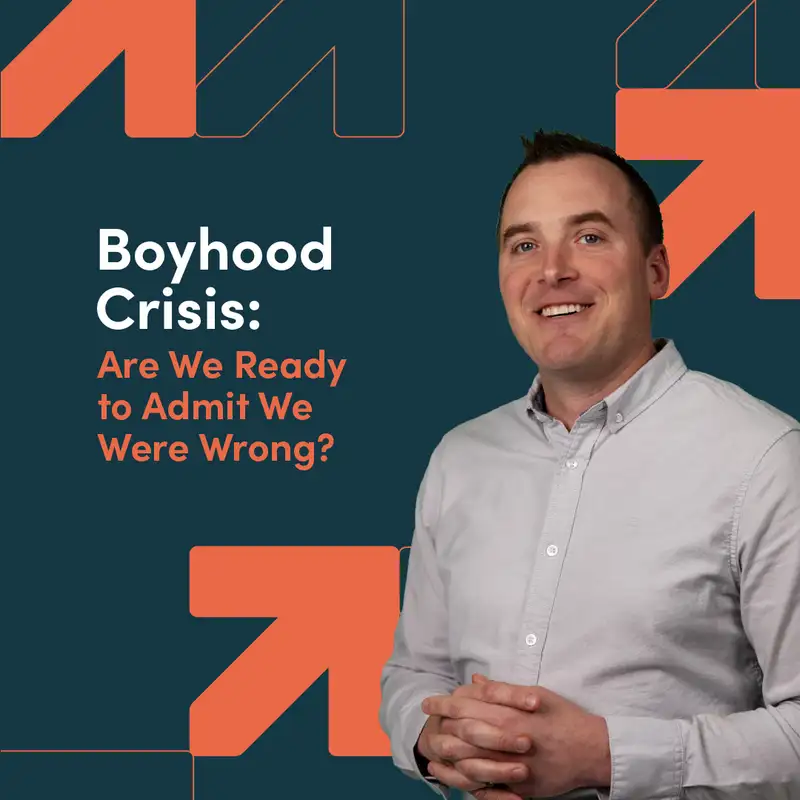Boyhood Crisis: Are We Ready to Admit We Were Wrong?
(0:08) Hello, everyone. (0:10) Thanks for listening to Wake Up, Look Up, a podcast where we connect events happening (0:15) in real time to the gospel of Jesus Christ. (0:18) I'm Zach Weihrauch, and in today's episode, we're talking about a boyhood crisis, and (0:22) we're asking the question, are we ready to admit that we were wrong? (0:26) This is prompted by a fascinating article that was in the New York Times.
(0:30) It was looking at the current crisis of boyhood, really for men in general, and comparing it (0:36) to a similar crisis in the early 20th century. (0:39) Let's just start with this. (0:41) If you listen to this podcast regularly, you already know this, but if you're new, let (0:45) me break this down for you.
(0:46) We have a crisis of masculinity in our culture. (0:50) There are a ton of stats that back this up. (0:52) Let me just hit you with a few.
(0:54) First, the suicide rate among young men is up 33% since 2010. (1:01) 33%! (1:03) That is an incredible percentage jump. (1:06) That is terrifying.
(1:08) Add into the fact that one in 10 men ages 20 to 24 are neither working or in school. (1:16) One in 10 of 20 to 24 are just sitting at home doing who knows what, obviously struggling (1:22) with their mental and emotional health, if we put those two stats together. (1:27) What the authors of the New York Times article did is they went back to a similar crisis (1:32) in the early 20th century, the early 1900s, and asked, well, what did they do then to (1:39) address the issues that were plaguing young men at the time? (1:42) The answer was they started a number of institutions.
(1:45) That's when the YMCA started or the Boy Scouts. (1:49) These organizations thought that the best way forward for young men was to put them in (1:55) environments with other young men being mentored and developed by older guys who could teach (2:01) them what it looked like to be a man who could encourage them, validate them, and get them (2:06) launched into the real world. (2:08) When the authors said, well, if that worked in the 1900s, why isn't it working now? (2:13) What they found is that the reason for that is we have destroyed every organization that (2:20) existed for young men.
(2:22) What's interesting is that some states are starting to pick up on this. (2:26) You're seeing governors in California and Maryland start to sound the alarm about young (2:32) men to say we need policy issues to deal with young men. (2:35) What's interesting about that is that both those governors are Democrats, and the Democrats (2:40) have led the charge on eradicating male spaces, making the argument that somehow by creating (2:47) spaces for boys, we are alienating women or people who experience gender dysphoria.
(2:54) The Boy Scouts should really just be scouts, and there really shouldn't be an environment (2:58) where only young men are going. (3:01) The message that they've been communicating is in some ways, it's bad to be a boy. (3:06) It's bad to be around other boys.
(3:07) It's bad to create spaces where we're simply trying to help boys to become men, and hey, (3:14) we reap what we sow. (3:15) As a culture, we've become toxic to young masculinity. (3:20) As a result, they're hearing us, and they're staying at home.
(3:23) They're struggling with their mental and emotional health, and they're no longer showing up (3:27) to spaces that in the beginning were designed to help them. (3:31) This article is sounding a call back to celebrating what it means to be a boy and what it means (3:37) to be a man, and I couldn't agree more. (3:40) Let's just start with this.
(3:42) Genesis 1, God creates male and female in His image. (3:47) All people made in the image of God, all people valuable, regardless of gender, regardless (3:51) of ability or disability, regardless of anything, but He does make them male and female, equal (3:59) but distinct. (4:01) Maleness matters.
(4:03) Femaleness matters. (4:04) Of course, if they're different, which of course they intrinsically are, they need different (4:10) environments to be fostered to actual health. (4:14) Not only is male and female different, not only does it look different to grow as a man (4:19) or grow as a woman, but older men, at least in the church, are supposed to be the ones (4:24) doing that work.
(4:25) Titus 2.2 says that older men should teach younger men. (4:30) Well, where does that happen? (4:31) That happens in dedicated spaces where we're saying it's good to be a man, it's good to (4:38) be a certain kind of man, and I can teach you how. (4:42) By the way, if you're offended by that, well, I don't know if we should single out men.
(4:45) Let's see. (4:46) Where did we get that idea from? (4:47) Oh, that's right. (4:48) Jesus, who when He picked 12 disciples, picked men that He spent three years hanging out (4:53) with to develop them.
(4:55) The result of that program, by the way, was changing the world and giving birth to Western (5:02) civilization. (5:03) So, pretty good endeavor on Jesus' part. (5:06) Putting men in an environment where they can learn how to be men is actually helpful, not (5:12) just to them, but to society as a whole.
(5:16) Malachi 4.6 reminds us that fatherlessness cripples generations, and we do have an outgoing (5:25) generation of fathers that have not done a great job. (5:28) There are bad fathers in every generation. (5:31) Well, who stands in the gap for kids who are missing a father if there are no spaces where (5:37) well-meaning, loving men can be surrogate fathers? (5:41) Spaces like athletic fields, spaces like the YMCA, like the Boy Scouts, or like the church, (5:49) especially for young men that don't have great father figures.
(5:52) Listen, Romans 12.2 tells us to not be conformed to the world, and sometimes we think about (5:57) that in all the wrong ways, but here's the right way. (6:00) The church must be a place that celebrates the value of boyhood, that celebrates the (6:06) value of men, that understands celebrating and valuing young men, celebrating and valuating (6:12) and valuing men leads to everyone being healthier, not over and against women. (6:18) And where does it say that to value one person is to devalue another one? (6:23) That is a stupid secular lie that we have to stop believing.
(6:28) Listen, I'll do an episode on young women and how we can care for them, because that (6:32) matters too. (6:33) That's not this episode. (6:35) We have a crisis, and we need to start by saying we were wrong to make younger boys (6:41) feel like they couldn't have enough value to hold their own spaces.
(6:46) Let's learn from the 1900s and reverse the tide, and let's start in the church. (6:52) This episode of Wake Up, Look Up was produced by Marcus Cunningham and Hallie Andrews. (6:56) Our topic researcher is Shanna Young.
(6:59) This episode was directed by Rima Saleh. (7:01) Our podcast coordinator is Hallie Andrews. (7:04) Our production manager and audio wizard is Marcus Cunningham, with tech and engineering (7:09) support from Matthew Adel and Landon Hall.
(7:11) I'm your host, Zach Weihrauch. (7:13) Join us for the next episode of Wake Up, Look Up.
Creators and Guests


